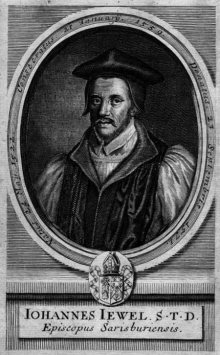Home
Authors
Titles
Keyword Search
Reference
|
John Jewel, a learned English churchman of the sixteenth century, was a fervent advocate of the Reformation, and fled England during Mary's reign to escape persecution. He returned in 1559 and was made Bishop of Salisbury the following year. Jewel published the first methodical statement of the position of the English church against the church of Rome, Apologia pro Ecclesia Anglicana, and a number of other works defending Anglicanism.
Jewel was educated at Merton and Corpus Christi colleges, Oxford. He became a fellow (faculty member) of Corpus Christi in 1542. In 1548, the continental Reformer Peter Martyr (Pietro Martiri Vermigli, 1491-1562) became Regius Professor of Divinity at Oxford and had a profound influence on Jewel, who became a leader among those seeking to reform the English Church. When Queen Mary ascended the throne in 1553, Jewel reluctantly signed Anti-Protestant articles; but he was still forced to flee for his life, arriving in Frankfurt in 1555. In Frankfurt, Jewel was regarded with suspicion by other Reformers, such as John Knox (who later led the Reformation of the Scottish Church along Presbyterian lines). Jewel publicly announced his repentance for having signed the Anti-Protestant Articles, but later had to defend the English Book of Common Prayer of 1552 against Knox and more extreme Reformers. After Elizabeth I became Queen in 1558, Jewel returned to England, in 1559, and was appointed Bishop of Salisbury in 1560. Due to a lack of adequate preaching by the clergy of his diocese (and in England as a whole during this period), Jewel took on a very public role as a preacher and writer of theological and devotional literature. In 1562, Jewel published his Apologia pro Ecclesia Anglicana (English translation: Apology for the Church of England), the first systematic defense of the Church of England against Roman Catholic claims. Written in Latin, it was designed to be circulated among scholars across Europe. It was translated into English by Lady Bacon in 1564. The Apology describes the beliefs and practices of the English Church and defends the ways in which Anglicanism departs from Roman Catholicism. Jewel makes the case that a Reformation of the Church was needed and that local provinces of the Church have the right to engage in reform. Jewel's work is distinguished by the scholarship reflected in it (particularly in references to the early Church Fathers) and the sophistication of the logic employed.
As an Anglican apologist, Jewel defended the Elizabethan Settlement (the polity and practice of the English Church that came into being under the reign of Elizabeth I). Jewel also defended the Church of England against the Puritans, who rejected the Book of Common Prayer and sought to replace the bishops with other forms of Church government. As Bishop of Salisbury, Jewel built the cathedral library and opened education in the cathedral school to underprivileged youth, among whom was Richard Hooker (1554-1600), whose Laws of Ecclesiastical Polity (published between 1593-1597) shows the influence of Jewel in striking a similar balance between Roman Catholicism on the one hand, and Puritanism and Presbyterianism on the other. The Classical Library, This HTML edition copyright ©2006. |
Home
Authors
Titles
Keyword Search
Reference
 John Jewel (1522-1571)
John Jewel (1522-1571)